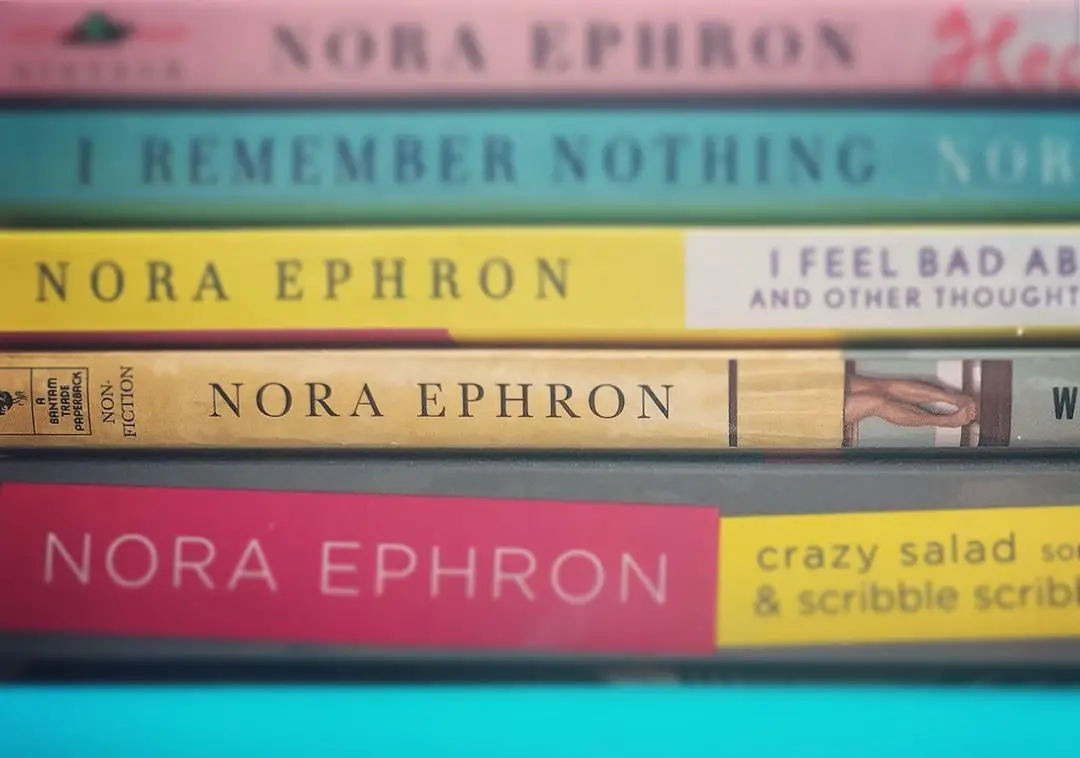Most college students are well-acquainted with the stress-induced meltdown; the struggle to balance classes, jobs and all-night study sessions can produce an almost palpable hysteria. For most students, finals-fueled stress is becoming a distant memory, and summer provides a much-needed opportunity for rest (and reconciliation with past screw-ups). Still, as the new semester draws closer, it’s time to honor the memory of a woman who certainly understood meltdowns: Nora Ephron.
Ephron built a career on sharp, well-placed words. First, as a journalist, she fought to ensure a place for women’s voices in what had previously been an all-male field, but she later branched out and unveiled her piercing wit in essays like “A Few Words About Breasts” and “Helen Gurley Brown Only Wants to Help.”
Out of all of her works, the world remembers Ephron’s iconic romantic comedies the most. She penned screenplays for famous titles such as “When Harry Met Sally,” “Sleepless in Seattle,” “You’ve Got Mail” and “Julie and Julia.”
The themes of each movie are very different, but three common threads run through Ephron’s body of work, and once you notice it, her familiarity with personal nuclear meltdowns is clear to see. College students can find neurotic characters who conquer difficulties in her delightfully sappy stories, and feel inspired to follow suit.
Ephron consistently creates imperfect characters
In an attempt to win the hearts of their audience, authors sometimes design faultless characters; if they have flaws, they’re little more than endearing trivialities: the main character might be clumsy, tripping over thin air and grinning ruefully in embarrassment, or they’re messy, until the end of the film, when their life falls in order and their apartment becomes immaculate. Ephron avoids these tropes entirely and, at certain times, her characters are downright unlikeable.
In “When Harry Met Sally,” Harry Burns first appears as a cynical college graduate. He suggests to Sally, whom he has just met, that she might “die one of those New York deaths where nobody notices for two weeks until the smell drifts into the hallway.” Good lord! Obviously, Burns is no knight in shining armor, and he has little desire to become one.
One of her later films, “Sleepless in Seattle,” introduces Annie Reed, a baby-faced journalist living in Baltimore. By all appearances, Reed is simply a sweet, hopeless romantic, but at one point she hires a private detective to trail the object of her affections: a man she has never met. The pair eventually ends up together, but her stalking endeavors are definitely unsettling.
Finally, in one of Ephron’s last films, she shamelessly flaunts her protagonist’s flaws. “Julie and Julia” follows Julie Powell, a discouraged New Yorker on the brink of turning 30. Sick of her cubicle job, Powell takes on a personal challenge to cook the 524 recipes in Julia Child’s cookbook. Although she’s a sympathetic character, Powell’s emotional outbursts can be irritating and awkward; after splattering the contents of an uncooked stuffed chicken on the floor, Powell suffers a self-described “meltdown” and collapses down into the gooey mess, crying “like a small, emotionally disturbed child.” In this moment, Powell is a ridiculous, but oddly relatable spectacle.
Like college students, Ephron’s characters are in transitional phases
College students, with our shifting schedules, occupy a constantly-changing stage of life. New demands uproot comfortable routines, and if you’ve ever made a friend in class and forgotten to get their number, you probably understand the unreliability of college experiences. Fate hurls unforeseen responsibilities at students every second. Throughout her work, Ephron demonstrates a significant understanding of transitional phases.
“When Harry Met Sally” contains a realistic depiction of divorce, and the resulting transition into single life. After his separation, Harry struggles to navigate the dating world, and he transforms from a heartbroken divorcee to a disillusioned playboy. Of course, he recovers by the movie’s end (this is a rom-com, after all), but Ephron refuses to gloss over his painful journey.
In “You’ve Got Mail,” Ephron brilliantly depicts a failed business endeavor. Kathleen Kelly, owner of a tiny children’s bookstore, finds she must close her beloved shop, and Kelly feels “as if a part of me has died,” and thoroughly grieves before seeking other employment. In contrast to lots of feel-good movies, Kelly does not get to reopen her store; rather, she reenters the job market and has to endure the awkward transition between careers.
Similarly, in “Julie and Julia”, the protagonists encounter rejection at every corner. The movie overflows with failed tests, half-finished books and abandoned projects. The characters become experts at adaptation and eventually glide from one challenge to the next, and Powell’s meltdowns, while not entirely absent, are considerably less dramatic. With time, she realizes to recognize the transitional phase in her life, and learns to embrace periods of change.
Ephron infuses her characters with relentless hopefulness
Mindy Kaling, famous author and actor best known for her work on “The Office,” once said, “Nora Ephron has been the single most influential person to me as an artist … Her characters were smart, funny, neurotic, but always hopeful. Hopefulness is everything. So much of comedy is about cynicism, which largely, her work didn’t have.” Ephron’s characters are optimistic, and viewers can unconsciously forgive their neuroses because they enjoy her characters’ persistent hope.
Kathleen Kelly, despite her professional woes, continues to delight in small pleasures: she remains enamored with beloved stories and, at one point, pauses to admire a butterfly peacefully fluttering on the subway. Julie Powell, to conquer an unrewarding career, cooks until she feels fulfilled, and finds that the intricacies of this seemingly-inconsequential pastime thrill her soul. One day, she exclaims, “Is there anything better than butter? The day there’s a meteorite heading toward the Earth and we have 30 days to live, I am going to spend it eating butter.”
In Ephron’s movies, simple delights, like butter and oddly placed butterflies, lend hope to struggling characters, who otherwise succumb to stress and collapse in ugly meltdowns. No one is above reproach, but, eventually, they rise to greet the beauty waiting outside. Perhaps this is why Kaling ultimately concludes, “I want to live every day as if every word or action was penned by Nora Ephron.” After all, Ephron penned realistic, yet heartbreakingly beautiful days.
Recently, the anniversary of the writer’s death slipped past the world. Seven years ago, on June 26, after struggling with acute myeloid leukemia, Ephron passed away. She left behind a string of sappy, wonderful rom-coms that remain a comfort to many, and as the new semester approaches, students can treat neurosis with stories from a meltdown-savvy mind.
















